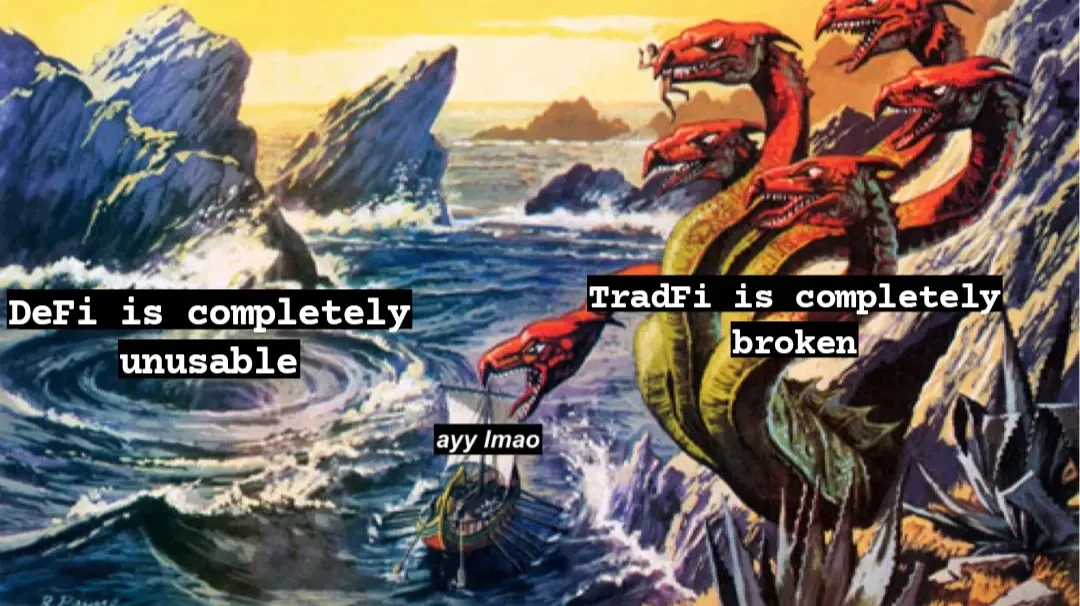A Letter to DeFi

The future of DeFi will look nothing like it currently does if it is to ever achieve either its mission or absolute full potential. The sector has an incredible amount of upside but is finding itself hampered by a lack of focus, arrogance, and uncertainty.
The Backdrop
Decentralised finance, shortened to simply DeFi, is the fundamental notion that access to financial services and security should be a universal right, and that we can leverage decentralised technologies to be able to realise this idea.
Blockchain and crypto technology can be used to bring us products that allow us to swap currencies and other tokens, safely store digital value, trade and exchange this value, and earn a return on that value through various mechanisms, all outside of the major centralised institutions and without needing any explicit permission to use them.
Current State
The current state of DeFi is frankly, an absolute mess. Plain and simple. The blame here isn’t all for DeFi, the crypto industry in general is in need of maturing right across the board.
Currently most of the volume and product launches are still being targeted towards speculators and a liquorice assortment of other bad actors. I’m not saying speculation is intrinsically bad, but if this is all this industry amounts to be, then that will be exceptionally disappointing.
Crypto in general is suffering heavily — near mortally — from a user experience problem. The simple idea of getting a wallet, buying some tokens, trading them, paying for something, or other actual useful applications of the space, is obtusely challenging, even for tech literate people.
Genuine, sector-changing attempts to tackle these problems are being hemmed in by ideologues and other maxi’s who think that “oh but if its not completely perfectly decentralised or trustless or blah then it’s clearly bad”. It’s time for them to grow up.
I’ll be writing a whole other piece around the “principles vs mass adoption” argument so I won’t get into it too much here, but at a base level, it’s insane that I even need to argue it. The time of the gatekeepers is coming to an end.
The Need
The technical capability to drive serious change is already here. I was part of an elite team last year that spent their entire time dedicated to solving these problems; and we did. There are plenty of teams out there that are seriously trying to drive the needle forwards, but hemmed in by this idea of “this isn’t where the market is right now” and in some sense thats true, the mistake being that if they think just servicing the current load of speculators is the only market there is, they’re wrong.
If we break down the world of consumer finance, it becomes pretty clear what the market has decided it wants:
- Store my money safely and let me spend it where I want to, how I want to, and don’t charge me too much to do that
- Let me save some of this money and maybe generate a return on that. If you could outperform inflation, that would be awesome.
- Let me send money to other people easily and safely (not safely comes second, as CashApp demonstrated)
If you ever find yourselves in the upper echelons of the financial consumer, you might also want:
- The ability to take loans and other credit products
- The ability to unlock liquidity in certain assets, such as wanting to refinance a house

Currently it is incredibly non-trivial to be able to do these things in DeFi, though thats not to say the primitives don’t exist. There is infrastructure and products out there that if you squint at looks almost exactly like this, but using it is basically impossible;
- There are lots products around spending crypto online, and in-person. These are particularly rampant in Latin America where the desire to get away from their native currency systems is palpable.
- You don’t have to go very far to find mechanisms for earning yield in DeFi, even when you strip away the ponzi schemes.
- Sending tokens between two wallets was literally one of the first use cases for crypto, just doing it isn’t a very enjoyable experience.
And with recent innovations we’re able to find;
- Platforms for unlocking liquidity in assets such as NFTs
- Real World Asset (RWA) platforms that are attempting to bring things like real-estate on-chain though these are very much still in their infancy
That Latin America point is quite poignant. Those of us that live in The West have this warped view of the world about what crypto really is and and how its being used, but throughout emerging markets, you’ll find real people who use it day-to-day to exchange money for regular household goods because even this hostile experience is worth it to them. They deserve to be serviced better.
The Vision
The future of DeFi will, to consumers, look a lot like modern Neobanks than they do their current form. There will be more than 1 player. They will choose to differentiate in different ways. This is the sign of a mature market.
They will be “wallet centric” apps similar to Neobank apps but not quite like how they look in either of them today. This app will be a gateway and key into a host of new apps, but you’d never know it; it’ll be cleanly abstracted away. This might be because the wallet provider itself, and the bank provider are separate entities, it might not be. The market will work out which of these models will work (more on wallet centrism in another post)
The app itself will be denominated in actual native currencies. Wallets denominating on ETH is ridiculous. ETH is not a currency, SOL isn’t a currency. USDC is a currency.
Users will be able to spend their money using traditional rails, and new ones. There will be debit cards that work on traditional rails, and products that manage this complexity will have strong moats.
We can transfer money to raw addresses, resolvable addresses such as ENS, or other KYC-ed pieces of data where they want to such as phone numbers or emails. This KYC data might be on-chain but private, it might not be. Either way the consumer market will require trivial mechanisms for the transfer of their money between their friends, and the market will provide it.
You’ll be able to recover their accounts. Trust will be put in entities or mechanisms that are considered intrinsically safe. For those who choose not to have this luxury and insist it must be trustless, there will be mechanisms for them too, though the complexity will increase accordingly. This will be okay, but won’t be the norm. The gatekeepers and maxi’s will shout, they are to be ignored *cough, ledger, cough*
A Cambrian explosion of new types of “savings accounts” will arrive, powered by the permissionless on-chain primitives of DeFi, finally unlocking its true power. Billions in liquidity will pour into pools, tokenised asset classes, project funds to bankroll initiatives people actually care about with verified returns, and all without needing to hunt them down in a fractured online nebula, an exercise we know most users simply do not care about.
People will be able to see completely how their money is being a force for good in the world, the carbon its removing, the charities its helping, the small businesses that are growing. It’ll be tracked and rewarded on-chain, and with it a new host of consumer benefits will arrive, with brands looking to target their specific niche of customer, creating new go-to-market strategies, and consumer choice.
Money shall be transacted. Preference shall be signalled not presumed. Experiences shall be tailored not modelled. The birds shall sing, and the sun shall shine.
Landscape
There is currently a handful of players who are all barking at this thesis, but there is still such a long way to go. A few honourable mentions I’ve been tracking;
- Ultimate. These started out as a DeFi specific wallet, which naturally falls under that whole “servicing the current speculators” thesis, but are chasing down the Neobank play. It’s an interesting GTM if they can execute it right having already captured the speculators, now can they service the regular consumer.
- Meld. These guys went the other way, building out a clear Neobank-on-top-of-wallet play first, and have done a pretty polished job of it. If they can execute an effective GTM and product roadmap, could be curious to watch
- Privy. An execution against “Web3 wallet for all the users”. They’re shaping up nicely to capture the mass-adoption wallet market. Should this be coupled with the right DeFi experience; could easily be a contender to bring the DeFi revolution we deserve.
I’m sure there are others, and I’m sure twitter will have fun pointing them out to me.
The Institutions
Institutions are not taking this lying down. Almost all of them are exploring what this means to their businesses; I talk to a lot of them. They, however, have more explicit and clear requirements of what they want and need out of the space; and what they’d be prepared to tolerate to get into it, something we’ll save for another post.
As the biggest names in traditional finance have declared that “tokenisation is the future” so too have the lines in the sand been drawn; this isn’t going away.
As TradFi bring their massive portfolios, risk appetites, and debt servicing, partnering it with the efficient, liquid, and open markets that DeFi provides, we’re destined to enter a new golden age of financial products for retail consumers not just in the west, but across the world.
Thinking that the sector itself is somehow better off without their interest or involvement is just silly.
Yes DeFi was in part born out of the notion that traditional finance has failed us — and in many cases it undoubtably has — but for it to really mature into the revolution it deserves to be, it’s time to put down the pitchforks and torches and have sensible conversations about what that looks like.
The regulatory scene is going to change around crypto, in the same way that it will all of finance. This pipe-dream that you can just run around in the crypto industry with no care or interest for consumer protection, international law, and basic financial prudence, is exactly that, a pipe dream. If this is you, grow up.
This isn’t to say that DeFi won’t be revolutionary change, it will. Being borderless and permissionless will allow global financial paradigm shift that means everyone everywhere can access the financial primitives they deserve, in a manner that doesn’t require you to have a masters degree in computer science to be able to use it not get scammed along the way.
Closing Remark
It’s time for this sector to evolve on-the-whole. It’s time for the gatekeepers to be moved aside. Not just so that we can realise the full potential and vision of DeFi, but so that the innovations we make along the way can unlock whole new ways of living and structuring society. The market has clearly signalled how it is prepared to interact with the digital world, it’s time we come and meet them there and service it.
